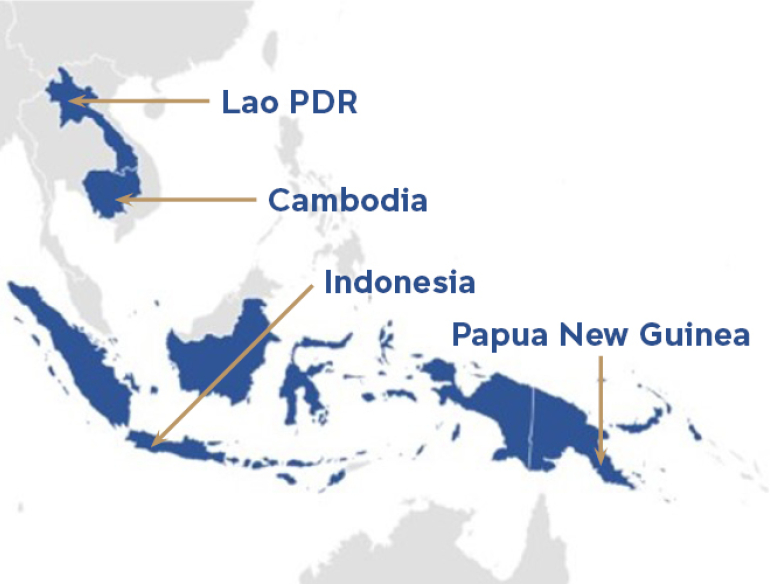Access to reliable, affordable and timely diagnostic testing is a critical part of COVID-19 pandemic response. The pandemic has further highlighted the need for dependable, rapid, and high-quality diagnosis at scale. Countries around the world and in our region have had to very swiftly scale-up their capability and capacity to conduct testing for COVID-19. However, availability, acceptability, affordability and high-quality diagnostic testing is not uniformly available within or across nations. While diagnostics have played a pivotal role in the management of the COVID-19 pandemic, access to appropriate diagnostic technology and laboratory quality management systems in some low- and middle-income countries has been limited. Rapid testing brings the laboratory to the community, and in the Indo-Pacific region, it has the potential to transform the way the pandemic is managed.
The Accelerating uptake of COVID-19 Ag RDTs in the Indo Pacific program aims to support and inform the effective and efficient uptake of diagnostic technologies for SARS-CoV-2, with a central focus on antigen rapid diagnostic tests (Ag RDTs), to strengthen COVID-19 responses across our region. This program is driven by FIND, the global alliance for diagnostics, in the context of their broader role in the global Access to COVID-19 Tools (ACT) Accelerator. The ACT-Accelerator diagnostics pillar, co-led by FIND, aims to significantly increase access to COVID-19 tests and sequencing, which will ensure effective test, trace, isolate, and treat strategies, as well as early identification and containment of new variants.
In Cambodia, Indonesia, Lao PDR, and Papua New Guinea the program is delivered by a Kirby-led consortium of longstanding, leading health partners including the Burnet Institute, the Clinton Health Access Initiative, and the Doherty Institute, working alongside counterparts on-the-ground in each country. Our organisations have been at the forefront of integrated diagnostic strategies for a range of infectious diseases including HIV and sexually transmissible infections for more than two decades, working in collaboration with our partners across the region. However, each country context is different, and rapid testing needs to be implemented in a nuanced way across each national health systems. Together with our in-country partners, and with this support from FIND, we are advancing the expansion and uptake of low-cost, high performance COVID-19 Ag RDTs so they can not only play a meaningful role in the COVID-19 pandemic response, but also potentially contribute to the control of other infectious diseases at the same time.
Countries across the Indo-Pacific region have had very different COVID-19 pandemics. Each of the four countries have identified a need for rapid antigen testing and have introduced it as part of their national response, but the challenge remains how to best integrate this into existing and complex health systems. Over one year (November 2021–November 2022), this AU$3.7 million investment will support locally driven activities to scale up and integrate COVID-19 Ag RDTs as part of pandemic management, building on strong existing cross-sector partnerships in each of the four countries. The program will deliver a suite of operational and implementation research projects, training activities and pilots, all designed to support the evidence-based use of COVID-19 Ag RDT and other diagnostics.
Collectively we plan to:
- Review and establish optimal locally appropriate Ag RDT testing strategies for COVID-19
- Train health care workers and other Ag RDT users to enhance quality and testing capacity
- Establish quality assurance frameworks to support quality control of COVID-19 testing
- Support country-led operational research to drive expansion of COVID-19 Ag RDTs within health facilities and the community
- Undertake health system evaluation and implementation research to drive integration of testing across relevant diseases and maximise COVID-19 diagnostic infrastructure
- Strengthen surveillance systems to integrate Ag RDTs, monitor their uptake and usage, and
- Evaluate new, cost-effective, low complexity viral sequencing technology.
Over time, the program will contribute to a strengthened evidence base to inform the present and future pandemic responses, and ultimately support enhanced access to reliable and timely testing for COVID-19 in Cambodia, Indonesia, Lao PDR, and Papua New Guinea. Importantly, the program's consortium approach also strengthens international collaboration, fosters knowledge sharing, and builds relationships between experts and researchers across institutions and countries.
This program is a collaborative effort between the Kirby Institute at UNSW of Sydney, Australia, the Foundation for Innovative New Diagnostics of Geneva, Switzerland, and our partners: Foundation for Innovative New Diagnostics (FIND); Burnet Institute; The Peter Doherty Institute for Infection and Immunity; Clinton Health Access Initiative (CHAI); Papua New Guinea Institute of Medical Research (PNGIMR); University of Health Sciences (UHS); University of Gadjah Mada (UGM).
Support for this program is provided through funding from The Foundation for Innovative New Diagnostics. The views expressed by the collaboration members and publication authors do not necessarily reflect the views of the funding agency.


